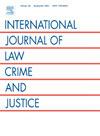Recruits' motivations for joining the police: A scoping review
IF 1.4
4区 社会学
Q3 CRIMINOLOGY & PENOLOGY
International Journal of Law Crime and Justice
Pub Date : 2025-10-01
DOI:10.1016/j.ijlcj.2025.100788
引用次数: 0
Abstract
Although interest in police recruitment has intensified, rigorous empirical work on why recruits choose policing remains scarce. This scoping review examines 22 peer-reviewed empirical studies published between 1973 and 2025, retrieved from Scopus and Web of Science databases, that examine the motivations expressed by entrants to police careers. It analyzes theoretical models, methods, contexts, concepts, and contributions to scholarship, classifying motivations according to Self-Determination Theory (SDT). It also highlights key studies, offers several practical recommendations to improve police recruitment processes, identifies gaps, and outlines directions for future research. Additionally, it discusses connections between SDT and levels of job satisfaction, professional commitment, career outlook and retention. The review contributes to advancing the debate on why individuals pursue policing careers and how their motivations may be shaped by professional practice, organizational culture, and early exposure to police culture.
新兵加入警察的动机:范围审查
尽管人们对警察招聘的兴趣日益浓厚,但关于新员工为什么选择当警察的严谨实证研究仍然很少。这一范围审查审查了1973年至2025年间发表的22项同行评议的实证研究,这些研究从Scopus和Web of Science数据库中检索出来,研究了警察职业新手所表达的动机。它分析了理论模型、方法、背景、概念和对学术的贡献,并根据自决理论(SDT)对动机进行了分类。它还强调了关键研究,提供了一些改进警察招聘过程的实用建议,确定了差距,并概述了未来研究的方向。此外,本文还讨论了SDT与工作满意度、专业承诺、职业前景和留任之间的关系。该综述有助于推动关于个人为什么追求警察职业以及他们的动机如何受到专业实践、组织文化和早期接触警察文化的影响的辩论。
本文章由计算机程序翻译,如有差异,请以英文原文为准。
求助全文
约1分钟内获得全文
求助全文
来源期刊
CiteScore
2.70
自引率
0.00%
发文量
25
审稿时长
47 days
期刊介绍:
The International Journal of Law, Crime and Justice is an international and fully peer reviewed journal which welcomes high quality, theoretically informed papers on a wide range of fields linked to criminological research and analysis. It invites submissions relating to: Studies of crime and interpretations of forms and dimensions of criminality; Analyses of criminological debates and contested theoretical frameworks of criminological analysis; Research and analysis of criminal justice and penal policy and practices; Research and analysis of policing policies and policing forms and practices. We particularly welcome submissions relating to more recent and emerging areas of criminological enquiry including cyber-enabled crime, fraud-related crime, terrorism and hate crime.

 求助内容:
求助内容: 应助结果提醒方式:
应助结果提醒方式:


